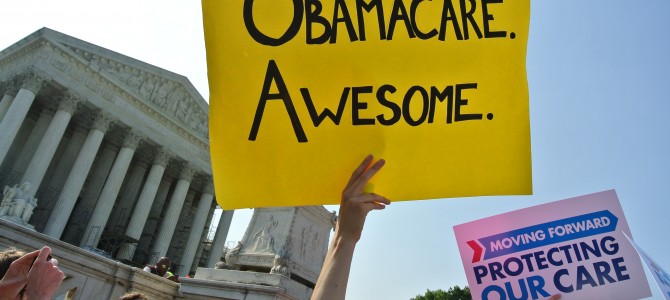
Blinders can be very useful in horse racing. Some horses are skittish and get distracted by the crowds and other horses closing in on them. The blinders prevent them from seeing the rest of the field and stay focused on the track ahead. Blinders aren’t so great in policy analysis. There, you want to be able to see the whole field so you know what’s coming at you and be able to prepare for it.
So it is sad to read Sarah Kliff’s Vox analysis of the Six Reasons Obamacare Premiums are Going Up Next Year. She isn’t wrong in what she writes, but she misses at least half the field. I would describe her six reasons as follows:
- Insurance premiums always go up, so it’s no big deal.
- While some may go up, others may go down, so it’s no big deal.
- Every state will be different, so it’s no big deal.
- Rates will go up in 2015 only if insurers set rates too low in 2014, so it’s no big deal.
- Even in 2015, the rates will mostly be guesswork, so it’s no big deal.
- The initial rate filings may be revised by the regulators, so it’s no big deal.
What is missing from this list is the role of regulations on premium costs. Ms. Kliff is not a foolish person and she interviewed a number of actuaries for her article. How could she have missed the most important factor?
She even cites an interesting example, Alabama versus Massachusetts, noting that in 2010 average monthly premiums were $437 in Massachusetts and only $136 in Alabama, but she attributed the difference in premiums solely to differences in how much providers get paid –
“Massachusetts tends to have higher prices because many academic hospitals in Boston are able to command really high prices. Alabama providers earn less, and premiums are cheaper there.”
The statement is true, but it barely scratches the surface of what might cause premium differences between Massachusetts and Alabama. For example, Alabama has FAR higher rates of smoking and obesity than Massachusetts does. Alabama is the second most obese state in the country at 32.3%, while Massachusetts is #48 at 22.3% and Alabama comes in #9 in rate of smoking (25%) while Massachusetts is #46 with 17%.
Both these factors should make Alabama a MORE expensive state than Massachusetts, yet premiums in Massachusetts are triple what they are in Alabama.
An even bigger factor, of course, is regulations. One example is state-mandated benefits such as requiring coverage of in vitro fertilization services or substance abuse treatment. The Council for Affordable Health Insurance has for many years counted up the total number of mandates in each state and found that Alabama has the second fewest at 19, while Massachusetts in one of the most mandated states with 48. And that is only the beginning. Massachusetts has long required modified community rating of premiums and guaranteed issue of coverage, which add substantially to the cost of coverage.
Other factors are often cited as lowering the cost of coverage. In these days of Obamacare, many people argue that expanding the numbers of uninsured will lower coverage costs for everybody. But, according to EBRI, in 2010 (the same year as Ms. Kliff cites for those premium differences), Massachusetts had an uninsured rate of 5.7%, while Alabama had 16.7%. Once again, if the argument is valid, Alabama should be MORE expensive, but it is not.
It is also often argued that having a monopoly raises prices, while having more competition lowers prices — yet for health insurance, Alabama has the least competitive market in the country, according to this KFF article. A single carrier (Blue Cross Blue Shield of Alabama) has 89% of the business in that state. The same article says of Massachusetts –
“But Massachusetts already had a relatively competitive market (before RomneyCare), so existing carriers competed with each other to create new, lower-cost plans in response to market demand — and pressure from state officials to keep costs down. Despite the emergence of low-cost plans, however, average premium prices have continued to rise.”
So what does all of this mean for premium increases under the Obama regime? In spite of Ms. Kliff’s blinders, we know for a fact that requiring richer benefits raises costs, and Obamacare requires coverage of many benefits that no state has ever required before. We know for a fact that other regulations such as community rating and guaranteed issue dramatically raises costs, and Obamacare requires the entire country to do that. And we know for a fact that attracting the sick and repelling the healthy will cause premiums to skyrocket. While the jury is still out, almost every intelligent analyst believes that is what is happening (and what will continue to happen) under Obamacare.
Of course, the great advantage of wearing blinders is that you don’t have to see anything that might upset you. So don’t worry: just tell yourself it’s no big deal.









